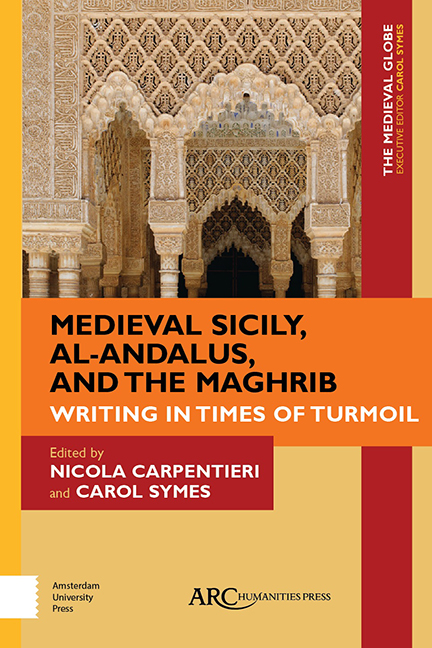Book contents
- Frontmatter
- Contents
- Acknowledgements
- Introduction
- The Indiculus luminosus and the Creation of a Ninth-Century Prophetic Conflict between Christianity and Islam
- Empire and Caliphate in the Life of John of Gorze
- The Writing of Munāẓarāt in Times of Turmoil: Disputations inFatimid Ifrīqiya
- Messaging and Memory: Notes from Medieval Ifrīqiya and Sicily
- “And God Dispersed Their Unity”: Historiographical Patterns in Recounting the End of Muslim Rule in Sicily and al-Andalus
- A Wondrous Past, a Dangerous Present: The Egyptian Temple of Akhmīm and the Martorana Church in Palermo, as Seen through Ibn Jubayr’s Travelogue
- How Does a Moorish Prince Become a Roman Caesar? Fictions and Forgeries, Emperors and Others from the Spanish “Flores” Romances to the Lead Books of Granada
- Index
Messaging and Memory: Notes from Medieval Ifrīqiya and Sicily
Published online by Cambridge University Press: 20 November 2020
- Frontmatter
- Contents
- Acknowledgements
- Introduction
- The Indiculus luminosus and the Creation of a Ninth-Century Prophetic Conflict between Christianity and Islam
- Empire and Caliphate in the Life of John of Gorze
- The Writing of Munāẓarāt in Times of Turmoil: Disputations inFatimid Ifrīqiya
- Messaging and Memory: Notes from Medieval Ifrīqiya and Sicily
- “And God Dispersed Their Unity”: Historiographical Patterns in Recounting the End of Muslim Rule in Sicily and al-Andalus
- A Wondrous Past, a Dangerous Present: The Egyptian Temple of Akhmīm and the Martorana Church in Palermo, as Seen through Ibn Jubayr’s Travelogue
- How Does a Moorish Prince Become a Roman Caesar? Fictions and Forgeries, Emperors and Others from the Spanish “Flores” Romances to the Lead Books of Granada
- Index
Summary
A NOTABLE FEATURE of the “digital” age has been the proliferation of short text messages, sent and received between cellphones and/ or computers. To this we may also add the automated ability to convert speech to text (and vice versa) across a range of languages, which has combined with texting to reduce or even collapse some established differences between oral and written forms of communication. As the inbox has gained ascendency over the letterbox and pigeonhole, so too has the capacity to store– – and delete– – text data. While it is true that vast amounts of messages are trivial, if we could access a filtered record of the most important it would constitute a valuable historical corpus. It was this idea that led me to see what could be recovered of missives from the medieval era when the documentary record was very much slimmer and when few written outputs were transmitted into later periods. The frame of reference for this study will be the central western Mediterranean, where we will turn first to an extraordinary body of notes in Arabic from Fatimid Ifrīqiya (roughly modern Tunisia) before visiting the multilingual environment of Muslim and early Norman Sicily. Here, as elsewhere, the problem for the medieval historian is not so much that there are no surviving reports of messaging, but rather that we know very little about how messages were transmitted and received in practice, and we can discern even less about the actual composition or literary form of notes. This type of writing was not intended to endure and, in most cases, it was not widely distributed either. Even so, many of the key issues of the study will be familiar to a present-day audience: questions of text conservation and loss; language choice and linguistic register of composition; oral and written interplay; the routing of messages; and the utility of notes as aides-mémoires in the construction of later records. One of the wider aims of this inquiry is to situate evidence for messaging in a new and positive light by regarding it as a heuristic tool for the historian, who is often faced with only scattered and fragmentary remains with which to work.
- Type
- Chapter
- Information
- Medieval Sicily, al-Andalus, and the MaghribWriting in Times of Turmoil, pp. 87 - 104Publisher: Amsterdam University PressPrint publication year: 2020



